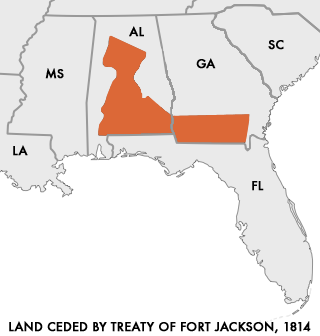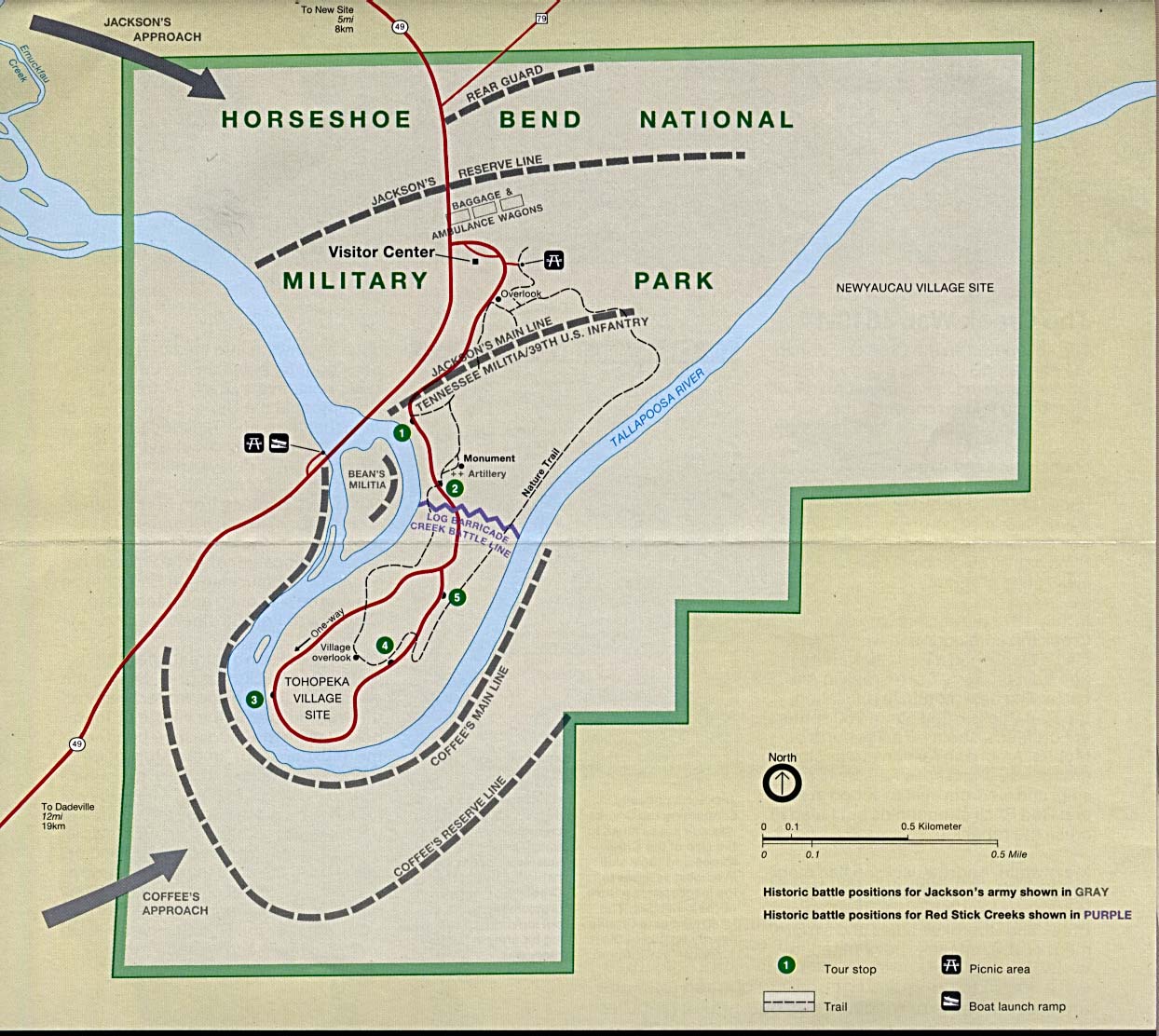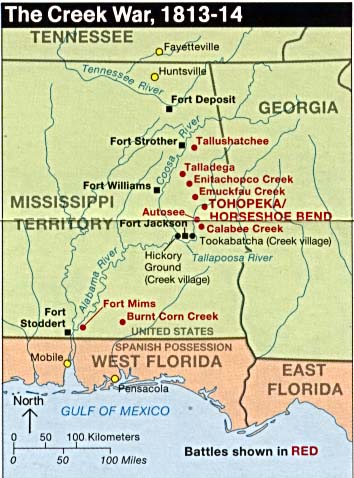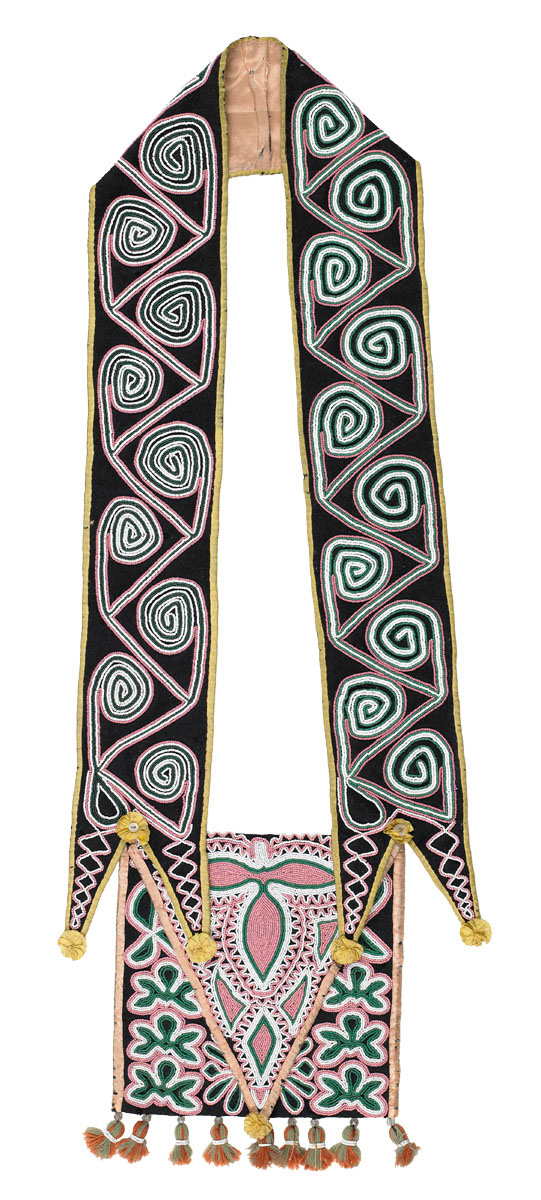|
George Mayfield
George Mayfield (1779−1848) was an interpreter and spy for General Andrew Jackson during the Creek War of 1813–1814. He is most notable for his dual existence between the white and Native American peoples of North America at a pivotal moment in the history of the United States. Early life and capture by the Creek Mayfield's father, Southerland Mayfield, lived on a Washington District (modern-day Tennessee) homestead on the frontier between the United States and the Creek Indian nation. On March 10, 1789, the Mayfield farm was attacked by a party of 10−12 Creek. The attack left all of the males of the Mayfield family dead except for 10-year-old George and his younger brother, who were held captive by the Creek. For the next 11 years, Mayfield lived among the Creek and became accustomed to their ways. He lost the ability to speak English and purportedly contracted a fondness for their mode of life. Reintroduction into American society The attack at his father's homestead ha ... [...More Info...] [...Related Items...] OR: [Wikipedia] [Google] [Baidu] |
Andrew Jackson
Andrew Jackson (March 15, 1767 – June 8, 1845) was an American lawyer, planter, general, and statesman who served as the seventh president of the United States from 1829 to 1837. Before being elected to the presidency, he gained fame as a general in the United States Army and served in both houses of the U.S. Congress. Although often praised as an advocate for ordinary Americans and for his work in preserving the union of states, Jackson has also been criticized for his racial policies, particularly his treatment of Native Americans. Jackson was born in the colonial Carolinas before the American Revolutionary War. He became a frontier lawyer and married Rachel Donelson Robards. He served briefly in the United States House of Representatives and the United States Senate, representing Tennessee. After resigning, he served as a justice on the Tennessee Supreme Court from 1798 until 1804. Jackson purchased a property later known as the Hermitage, becoming a wealth ... [...More Info...] [...Related Items...] OR: [Wikipedia] [Google] [Baidu] |
Nashville
Nashville is the capital city of the U.S. state of Tennessee and the seat of Davidson County. With a population of 689,447 at the 2020 U.S. census, Nashville is the most populous city in the state, 21st most-populous city in the U.S., and the fourth most populous city in the southeastern U.S. Located on the Cumberland River, the city is the center of the Nashville metropolitan area, which is one of the fastest growing in the nation. Named for Francis Nash, a general of the Continental Army during the American Revolutionary War, the city was founded in 1779. The city grew quickly due to its strategic location as a port on the Cumberland River and, in the 19th century, a railroad center. Nashville seceded with Tennessee during the American Civil War; in 1862 it was the first state capital in the Confederacy to be taken by Union forces. After the war, the city reclaimed its position and developed a manufacturing base. Since 1963, Nashville has had a consolidated city-count ... [...More Info...] [...Related Items...] OR: [Wikipedia] [Google] [Baidu] |
1779 Births
Events January–March * January 11 – British troops surrender to the Marathas in Wadgaon, India, and are forced to return all territories acquired since 1773. * January 11 – Ching-Thang Khomba is crowned King of Manipur. * January 22 – American Revolutionary War – Claudius Smith is hanged at Goshen, Orange County, New York for supposed acts of terrorism upon the people of the surrounding communities. * January 29 – After a second petition for partition from its residents, the North Carolina General Assembly abolishes Bute County, North Carolina (established 1764) by dividing it and naming the northern portion Warren County (for Revolutionary War hero Joseph Warren), the southern portion Franklin County (for Benjamin Franklin). The General Assembly also establishes Warrenton (also named for Joseph Warren) to be the seat of Warren County, and Louisburg (named for Louis XVI of France) to be the seat of Franklin County. * February ... [...More Info...] [...Related Items...] OR: [Wikipedia] [Google] [Baidu] |
People Of The Creek War
A person ( : people) is a being that has certain capacities or attributes such as reason, morality, consciousness or self-consciousness, and being a part of a culturally established form of social relations such as kinship, ownership of property, or legal responsibility. The defining features of personhood and, consequently, what makes a person count as a person, differ widely among cultures and contexts. In addition to the question of personhood, of what makes a being count as a person to begin with, there are further questions about personal identity and self: both about what makes any particular person that particular person instead of another, and about what makes a person at one time the same person as they were or will be at another time despite any intervening changes. The plural form "people" is often used to refer to an entire nation or ethnic group (as in "a people"), and this was the original meaning of the word; it subsequently acquired its use as a plural form of p ... [...More Info...] [...Related Items...] OR: [Wikipedia] [Google] [Baidu] |
American Spies
American(s) may refer to: * American, something of, from, or related to the United States of America, commonly known as the "United States" or "America" ** Americans, citizens and nationals of the United States of America ** American ancestry, people who self-identify their ancestry as "American" ** American English, the set of varieties of the English language native to the United States ** Native Americans in the United States, indigenous peoples of the United States * American, something of, from, or related to the Americas, also known as "America" ** Indigenous peoples of the Americas * American (word), for analysis and history of the meanings in various contexts Organizations * American Airlines, U.S.-based airline headquartered in Fort Worth, Texas * American Athletic Conference, an American college athletic conference * American Recordings (record label), a record label previously known as Def American * American University, in Washington, D.C. Sports teams Soccer * ... [...More Info...] [...Related Items...] OR: [Wikipedia] [Google] [Baidu] |
Treaty Of Fort Jackson
The Treaty of Fort Jackson (also known as the Treaty with the Creeks, 1814) was signed on August 9, 1814 at Fort Jackson near Wetumpka, Alabama following the defeat of the Red Stick (Upper Creek) resistance by United States allied forces at the Battle of Horseshoe Bend. It occurred on the banks of the Tallapoosa River near the present city of Alexander City, Alabama. The U.S. force, led by General Andrew Jackson, consisted mainly of the West Tennessee Militia and 39th United States Infantry, allied with several groups of Cherokee and Lower Creek friendly to the American side. The Upper Creek were led by Chief Menawa, who fled with hundreds of survivors into Florida, where they allied with the Seminole. The surrender ended the Creek War, which the United States was fighting simultaneously with the War of 1812."Fort Jackson Tr ... [...More Info...] [...Related Items...] OR: [Wikipedia] [Google] [Baidu] |
Battle Of Horseshoe Bend (1814)
The Battle of Horseshoe Bend (also known as ''Tohopeka'', ''Cholocco Litabixbee'', or ''The Horseshoe''), was fought during the War of 1812 in the Mississippi Territory, now central Alabama. On March 27, 1814, United States forces and Indian allies under Major General Andrew Jackson defeated the Red Sticks, a part of the Creek Indian tribe who opposed American expansion, effectively ending the Creek War. Background The Creek Indians of Georgia and the eastern part of the Mississippi Territory had become divided into two factions: the Upper Creek (or Red Sticks), a majority who opposed American expansion and sided with the British and the colonial authorities of Spanish Florida during the War of 1812; and the Lower Creek, who were more assimilated into the Anglo culture, had a stronger relationship with the U.S. Indian Agent Benjamin Hawkins, and sought to remain on good terms with the Americans. The Shawnee war leader Tecumseh visited Creek and other Southeast Indi ... [...More Info...] [...Related Items...] OR: [Wikipedia] [Google] [Baidu] |
Creek Language
The Muscogee language (Muskogee, ''Mvskoke'' in Muscogee), also known as Creek, is a Muskogean language spoken by Muscogee (Creek) and Seminole people, primarily in the US states of Oklahoma and Florida. Along with Mikasuki, when it is spoken by the Seminole, it is known as Seminole. Historically, the language was spoken by various constituent groups of the Muscogee or ''Maskoki'' in what are now Alabama and Georgia. It is related to but not mutually intelligible with the other primary language of the Muscogee confederacy, Hitchiti-Mikasuki, which is spoken by the kindred Mikasuki, as well as with other Muskogean languages. The Muscogee first brought the Muscogee and Miccosukee languages to Florida in the early 18th century. Combining with other ethnicities there, they emerged as the Seminole. During the 1830s, however, the US government forced most Muscogee and Seminole to relocate west of the Mississippi River, with most forced into Indian Territory. The language is today ... [...More Info...] [...Related Items...] OR: [Wikipedia] [Google] [Baidu] |
James Madison
James Madison Jr. (March 16, 1751June 28, 1836) was an American statesman, diplomat, and Founding Father. He served as the fourth president of the United States from 1809 to 1817. Madison is hailed as the "Father of the Constitution" for his pivotal role in drafting and promoting the Constitution of the United States and the Bill of Rights. Madison was born into a prominent slave-owning planter family in Virginia. He served as a member of the Virginia House of Delegates and the Continental Congress during and after the American Revolutionary War. Unsatisfied with the weak national government established by the Articles of Confederation, he helped organize the Constitutional Convention, which produced a new constitution. Madison's Virginia Plan was the basis for the Convention's deliberations, and he was an influential voice at the convention. He became one of the leaders in the movement to ratify the Constitution, and joined Alexander Hamilton and John Jay in writi ... [...More Info...] [...Related Items...] OR: [Wikipedia] [Google] [Baidu] |
English Language
English is a West Germanic language of the Indo-European language family, with its earliest forms spoken by the inhabitants of early medieval England. It is named after the Angles, one of the ancient Germanic peoples that migrated to the island of Great Britain. Existing on a dialect continuum with Scots, and then closest related to the Low Saxon and Frisian languages, English is genealogically West Germanic. However, its vocabulary is also distinctively influenced by dialects of France (about 29% of Modern English words) and Latin (also about 29%), plus some grammar and a small amount of core vocabulary influenced by Old Norse (a North Germanic language). Speakers of English are called Anglophones. The earliest forms of English, collectively known as Old English, evolved from a group of West Germanic ( Ingvaeonic) dialects brought to Great Britain by Anglo-Saxon settlers in the 5th century and further mutated by Norse-speaking Viking settlers starting in ... [...More Info...] [...Related Items...] OR: [Wikipedia] [Google] [Baidu] |
Creek War
The Creek War (1813–1814), also known as the Red Stick War and the Creek Civil War, was a regional war between opposing Indigenous American Creek factions, European empires and the United States, taking place largely in modern-day Alabama and along the Gulf Coast. The major conflicts of the war took place between state militia units and the " Red Stick" Creeks. The United States government formed an alliance with the Choctaw Nation and Cherokee Nation (the traditional enemies of the Creeks), along with the remaining Creeks to put the rebellion down. According to historian John K. Mahon, the Creek War "was as much a civil war among Creeks as between red and white, and it pointed up the separation of Creeks and Seminoles". The war was also part of the centuries-long American Indian Wars. It is usually considered part of the War of 1812 because it was influenced by Tecumseh's War in the Old Northwest, was concurrent with the American-British portion of the war and involved m ... [...More Info...] [...Related Items...] OR: [Wikipedia] [Google] [Baidu] |
Creek (people)
The Muscogee, also known as the Mvskoke, Muscogee Creek, and the Muscogee Creek Confederacy ( in the Muscogee language), are a group of related indigenous (Native American) peoples of the Southeastern WoodlandsTranscribed documents Sequoyah Research Center and the American Native Press Archives in the . Their original homelands are in what now comprises southern , much of , western |


.jpg)
_1938.jpg)





